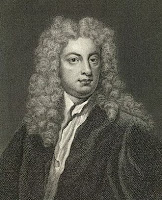Muriel Nelson lives near Seattle and is the author of three poetry books — Part Song (1999, Bear Star Press) and the chapbooks Most Wanted (2003), and Please Hold (2021). She has taught at Pierce College and Muckleshoot Tribal College — both in Washington State. Her poems have been extensively published in American literary journals.
One writer, Patricia Corbus, said, “In Please Hold there’s melody, jazzy dissonance, flashes of tonal change, freshness of sound and image.” This observation fits with Nelson’s background, since she studied music at Willamette University, and has received her Master of Musicology from the University of Illinois. She also received her MFA in Writing from Warren Wilson College in North Carolina.
The following poem first appeared in The Christian Century.
Instead—musings on Psalm 42
If Herbert Howells hadn’t held a tune
in his ear as bombs kept falling on London,
if he hadn’t argued with himself—like
or as?—and come up with a tie (both),
if he hadn’t let his melody make more
of his awkward choice than the psalmist’s point,
we wouldn’t have the flowing rhythm of “Like as
the Hart” to carry us now, or occasion for our choir
to stop rehearsing and hear a pastor
muse that the ancients followed the hart (the heart)
which could sense unseen water (a diviner)
and lead a thirsty soul in hopes for a spring
into graceful deerlike ways of lifelong longing.
Entry written by D.S. Martin. He is the author of five poetry collections including Angelicus (2021, Cascade) ― a book of poems written from the point-of-view of angels. His books are available through Wipf & Stock.
Monday, March 28, 2022
Monday, March 21, 2022
John O’Donnell
John O’Donnell is a Dublin barrister, poet and writer whose most recent collection is his Sunlight: New and Selected Poems (2018, Dedalus Press) which includes poetry from his three previous collections. His awards include the Hennessy Award for Poetry, the Ireland Funds Prize, and the SeaCat National Poetry Prize. O’Donnell’s short fiction has also garnered awards, and has been gathered into his first fiction collection Almost the Same Blue (2020, Doire Press).
He has written several poems from the perspective of various characters who encountered Jesus in the gospels, including: “Jairus” whose daughter Christ raised from the dead, “A Wedding Guest” about the marriage at Cana, and “Some Other Country” which is from the perspective of Pilate.
The following poem which first appeared in Poetry Ireland Review is another written as an expression of a story from the life of Christ.
The Storm
We should have seen it coming, I suppose,
but we were dog-tired when we left, and skies
seemed clear, the sun’s work done, sinking astern.
He’d flaked out down below, missing his turn
to steer ― and who could blame him wanting peace
from days of heat and dust, and everywhere
excited hordes, clamouring for a piece
of him. A shame to wake him, but we were
in real trouble, too late to shorten sail,
heaving waves swamping the decks, the boom of gale
enough to raise the dead. I slapped his face:
‘We’re going down! Don’t you care?’ He blinked, then stared
as if he’d come back from another place
to wind and water, waiting for his word.
Entry written by D.S. Martin. He is the author of five poetry collections including Angelicus (2021, Cascade) ― a book of poems written from the point-of-view of angels. His books are available through Wipf & Stock.
He has written several poems from the perspective of various characters who encountered Jesus in the gospels, including: “Jairus” whose daughter Christ raised from the dead, “A Wedding Guest” about the marriage at Cana, and “Some Other Country” which is from the perspective of Pilate.
The following poem which first appeared in Poetry Ireland Review is another written as an expression of a story from the life of Christ.
The Storm
We should have seen it coming, I suppose,
but we were dog-tired when we left, and skies
seemed clear, the sun’s work done, sinking astern.
He’d flaked out down below, missing his turn
to steer ― and who could blame him wanting peace
from days of heat and dust, and everywhere
excited hordes, clamouring for a piece
of him. A shame to wake him, but we were
in real trouble, too late to shorten sail,
heaving waves swamping the decks, the boom of gale
enough to raise the dead. I slapped his face:
‘We’re going down! Don’t you care?’ He blinked, then stared
as if he’d come back from another place
to wind and water, waiting for his word.
Entry written by D.S. Martin. He is the author of five poetry collections including Angelicus (2021, Cascade) ― a book of poems written from the point-of-view of angels. His books are available through Wipf & Stock.
Monday, March 14, 2022
Joseph Addison*
Joseph Addison (1672―1719), the son of an eminent clergyman, is an English poet, essayist, playwright and politician. His first book, Account of the Greatest English Poets (1694), and his translation of Virgil’s Georgics appeared while he was still a student at Magdalen College, Oxford. His early success drew the admiration of his peers, and the attention of wealthy benefactors.
A commission to write a poem for the Battle of Blenheim (The Campaign) also impressed the Earl of Halifax, which led to a position within his government. Addison not only served as a member of parliament, but rose to the position of Secretary of State in 1717. Although his play Cato was a literary influence on the American Revolution ― George Washington having sponsored a performance of Cato for the Continental Army at Valley Forge ― Addison is best known today for his essays.
The following is just one of several hymns penned by Addison.
How Are Thy Servants Blest, O Lord!
How are Thy servants blest, O Lord!
How sure is their defense!
Eternal wisdom is their guide,
Their help Omnipotence.
In foreign realms, and lands remote,
Supported by Thy care,
Through burning climes they pass unhurt,
And breathe in tainted air.
When by the dreadful tempest borne
High on the broken wave,
They know Thou art not slow to her,
Nor impotent to save.
The storm is laid, the winds retire,
Obedient to Thy will,
The sea, that roars at Thy command,
At Thy command is still.
From all our griefs and fears, O Lord,
Thy mercy sets us free;
While in the confidence of prayer
Our hearts take hold on Thee.
In midst of dangers, fears and death,
Thy goodness we adore;
We praise Thee for Thy mercies past,
And humbly hope for more
Our life, while Thou preservest life,
A sacrifice shall be;
And death, when death shall be our lot,
Shall join our souls to Thee.
*This is the second Kingdom Poets post about Joseph Addison: first post.
Entry written by D.S. Martin. He is the author of five poetry collections including Angelicus (2021, Cascade) ― a book of poems written from the point-of-view of angels. His books are available through Wipf & Stock.
A commission to write a poem for the Battle of Blenheim (The Campaign) also impressed the Earl of Halifax, which led to a position within his government. Addison not only served as a member of parliament, but rose to the position of Secretary of State in 1717. Although his play Cato was a literary influence on the American Revolution ― George Washington having sponsored a performance of Cato for the Continental Army at Valley Forge ― Addison is best known today for his essays.
The following is just one of several hymns penned by Addison.
How Are Thy Servants Blest, O Lord!
How are Thy servants blest, O Lord!
How sure is their defense!
Eternal wisdom is their guide,
Their help Omnipotence.
In foreign realms, and lands remote,
Supported by Thy care,
Through burning climes they pass unhurt,
And breathe in tainted air.
When by the dreadful tempest borne
High on the broken wave,
They know Thou art not slow to her,
Nor impotent to save.
The storm is laid, the winds retire,
Obedient to Thy will,
The sea, that roars at Thy command,
At Thy command is still.
From all our griefs and fears, O Lord,
Thy mercy sets us free;
While in the confidence of prayer
Our hearts take hold on Thee.
In midst of dangers, fears and death,
Thy goodness we adore;
We praise Thee for Thy mercies past,
And humbly hope for more
Our life, while Thou preservest life,
A sacrifice shall be;
And death, when death shall be our lot,
Shall join our souls to Thee.
*This is the second Kingdom Poets post about Joseph Addison: first post.
Entry written by D.S. Martin. He is the author of five poetry collections including Angelicus (2021, Cascade) ― a book of poems written from the point-of-view of angels. His books are available through Wipf & Stock.
Labels:
Joseph Addison,
Virgil
Monday, March 7, 2022
Jane Greer
Jane Greer is the author of two poetry books, whose publications are separated by more than thirty years. Bathsheba on the Third Day (1986) and her new collection Love like a Conflagration (2020).
She founded Plains Poetry Journal in 1981 ― a literary publication dedicated to promoting the poetry of the New Formalism ― which she edited until 1993. She has taught writing at Bismarck State College, and has worked for two decades as a civil servant for the state of North Dakota.
It was while sitting in a New Orleans café, that the idea for a new poem struck her, which led to Greer’s return to steadily writing verse. The following poem first appeared in First Things.
This Blue
The way the light of you
finds me through the hot,
bright unnamable blue,
that square of ancient glass
in the high apse window,
backlit at mid-day Mass:
blue should not feel like burning,
like a blazing lighthouse lamp,
so here I am, learning
this color like a child
too young for words: this blue
to seek me, self-exiled;
this blue to find me, hiding;
this blue to hold me, helpless,
in your cool fire abiding.
Just a small shard, this blue,
yet I am pierced and pinned.
For me, today, no credo: only you.
Posted with permission of the poet.
This post was suggested by my friend Burl Horniachek.
Entry written by D.S. Martin. He is the author of five poetry collections including Angelicus (2021, Cascade) ― a book of poems written from the point-of-view of angels. His books are available through Wipf & Stock.
She founded Plains Poetry Journal in 1981 ― a literary publication dedicated to promoting the poetry of the New Formalism ― which she edited until 1993. She has taught writing at Bismarck State College, and has worked for two decades as a civil servant for the state of North Dakota.
It was while sitting in a New Orleans café, that the idea for a new poem struck her, which led to Greer’s return to steadily writing verse. The following poem first appeared in First Things.
This Blue
The way the light of you
finds me through the hot,
bright unnamable blue,
that square of ancient glass
in the high apse window,
backlit at mid-day Mass:
blue should not feel like burning,
like a blazing lighthouse lamp,
so here I am, learning
this color like a child
too young for words: this blue
to seek me, self-exiled;
this blue to find me, hiding;
this blue to hold me, helpless,
in your cool fire abiding.
Just a small shard, this blue,
yet I am pierced and pinned.
For me, today, no credo: only you.
Posted with permission of the poet.
This post was suggested by my friend Burl Horniachek.
Entry written by D.S. Martin. He is the author of five poetry collections including Angelicus (2021, Cascade) ― a book of poems written from the point-of-view of angels. His books are available through Wipf & Stock.
Subscribe to:
Comments (Atom)






















